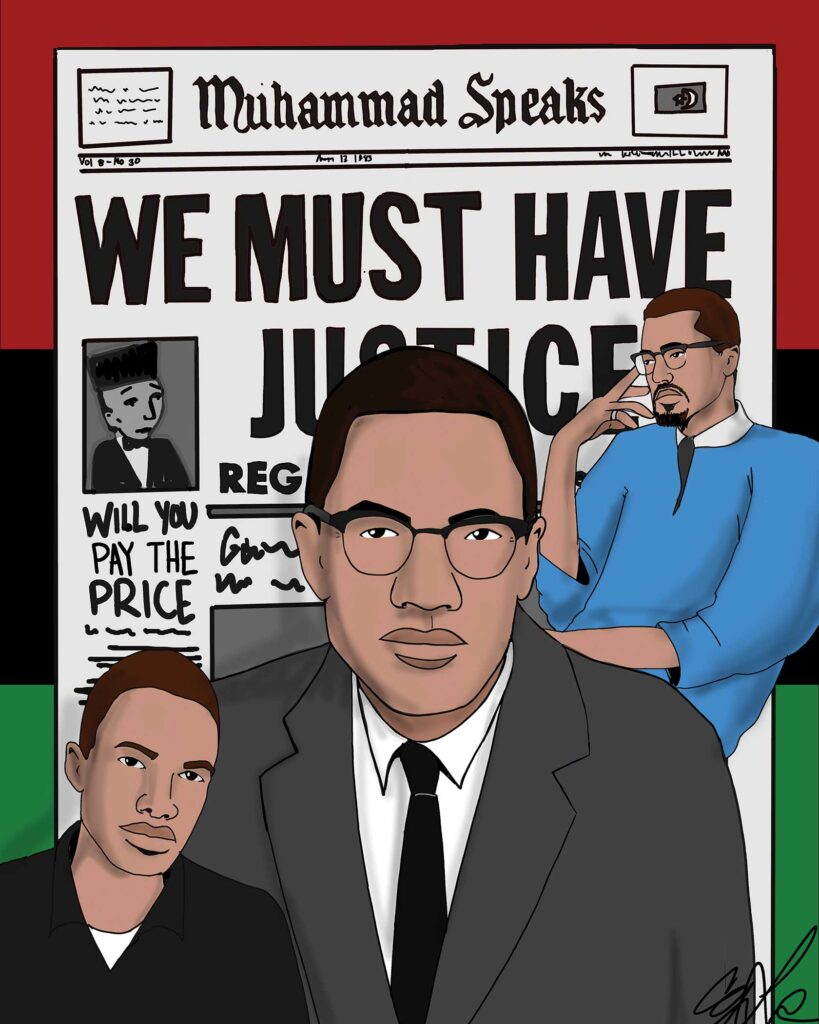
More than six decades after he first stepped into the national spotlight, Malcolm X remains one of the most compelling, controversial and misunderstood figures in American history. Where others preached patience, he demanded dignity. Where others sought gradual change, he exposed systemic rot.
To those who claimed he was too angry, he simply replied, “I am for truth, no matter who tells it. I’m for justice, no matter who it is for or against.”
In a world that often dilutes resistance into hashtags and applause lines, Malcolm’s words remain a litmus test for honesty. He did not care to be comfortable. He cared to be correct. And for that, America both feared and vilified him.
Unlike his contemporaries who spoke of dreams, Malcolm X spoke of waking up. “The future belongs to those who prepare for it today,” he warned in 1962, challenging Black Americans to build their own power rather than wait for handouts. His advocacy for self-reliance, community protection, intellectual rigor and critical thinking was not a rejection of peace, it was a demand for agency.
Those who labeled him a militant often ignored what he was reacting to: centuries of violence — state-sanctioned, economic and cultural. At the Militant Labor Forum in New York City, he remarked, “You can’t separate peace from freedom because no one can be at peace unless he has his freedom.” To Malcolm, asking the oppressed to respond to violence with silence was not peacekeeping, it was perpetuation.
He also named the enemy with a clarity that many shy away from still. In one of his most quoted observations, he said, “The media’s the most powerful entity on Earth. They have the power to make the innocent guilty and the guilty innocent.”
It was not paranoia, but prescience. Today, as algorithms distort truth and image manipulation rewrites history in real time, his warning resounds louder than ever.
What makes Malcolm X timeless is not just what he said, but how willing he was to evolve. After his pilgrimage to Mecca, he spoke with greater nuance about race and solidarity, saying, “I am not a racist. … I do not judge a man by the color of his skin but by his behavior.” His capacity for transformation, even at personal risk, is a profound lesson in moral courage.
Malcolm X did not live to see 40 years of age. He was assassinated on February 21, 1965, ironically, at a time when he was beginning to be heard more widely, even by those who once dismissed him.
But his voice lives on. In every community grappling with police brutality, in every debate about Black autonomy, and in every young activist confronting the machinery of injustice, Malcolm speaks.
And perhaps that is the greatest testament to his legacy. He was never interested in being liked. He was interested in being right. Malcolm X said, “If you’re not ready to die for it, put the word ‘freedom’ out of your vocabulary.”
We would do well to remember that in our own age of euphemism and performance.
In contemporary movements like Black Lives Matter, we see echoes of Malcolm X’s uncompromising demand for justice and his willingness to challenge the status quo. His speeches and writings continue to be studied and quoted, inspiring new generations of activists, scholars and artists. He remains a potent symbol of resistance against oppression and a powerful voice for the voiceless.
While some of his earlier rhetoric remains controversial, particularly his separatist views, understanding the context of his time and the evolution of his thought is crucial. Malcolm X’s legacy is not monolithic; it is a complex tapestry woven with threads of anger, resilience, intellectual growth, and an unwavering commitment to Black liberation. His life and ideas continue to provoke dialogue, challenge assumptions, and inspire the ongoing struggle for a more just and equitable world.
His emphasis on self-determination and economic empowerment resonates with movements advocating Black-owned businesses and community development. The concept of Black pride, which he so passionately championed, remains a cornerstone of Black identity and cultural expression. His impact in 2025, lies not just in the specific solutions he proposed, but in his fierce urgency, his commitment to truth-telling, and his enduring call for Black people to define themselves and fight for their rightful place in the world.
Malcolm X’s unwavering critique of systemic racism continues to inform contemporary discussions on racial inequality, police brutality, and the enduring legacy of slavery.
Andre Stark
Assoc. Publisher, Bay State Banner






